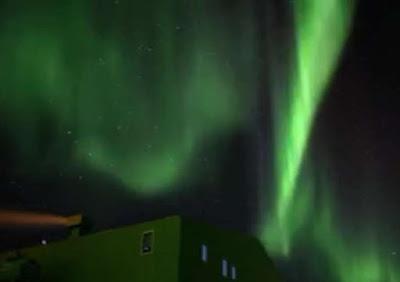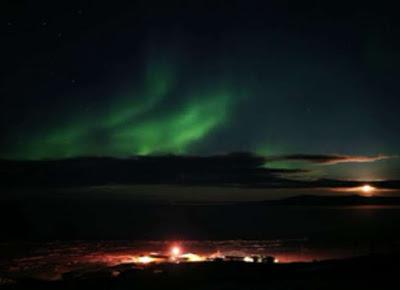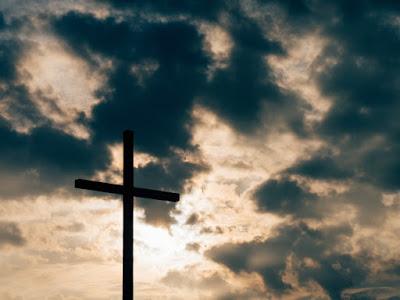For the wrath of God is revealed from heaven against all ungodliness and unrighteousness of men, who by their unrighteousness suppress the truth. For what can be known about God is plain to them, because God has shown it to them. For his invisible attributes, namely, his eternal power and divine nature, have been clearly perceived, ever since the creation of the world, in the things that have been made. So they are without excuse. (Romans 1:18-20)
How does this play out, exactly? How are His invisible attributes seen and known? How is it that what can be known about God is made plain to people whose minds are darkened?
I was watching a very excellent documentary called "Antarctica: A Year On Ice". It follows the people who live and work through a year's cycle at the various scientific stations on the most remote and brutal continent on the planet. The continent is staffed with about 1100 people at various international stations up and down the Antarctic coast. The largest is the United States' McMurdo Station. In most documentaries, they show the scientists working. Penguins, climate change, volcanic action, geology...but this documentary features the people who staff the stations in support of the scientists' work. The regular folks.
The documentary further features the many hundreds of regular people who both work there during the summer, and who "winter over." They man the store, staff the fire station, fix tractors, cook the meals, wash the dishes, take inventory of all the equipment, etc. When the last plane out at the end of summer leaves, they stay. Thus, the wintering over experience is unique to only a few individuals each year, as the full swell of 1100 during summer dwindles to only about 200 souls spread out among 30 scientific stations during winter in the Antarctic.
Living where there is no hope of departure for 6 months, in brutally cold and windy conditions, in darkness as the sun disappears below the horizon, with only a few dozen people around you...is something that only a few are allowed to experience.

Screen shot from "Antarctica: A Year On Ice". Aurora Australis
Interestingly most of the people who "winter over" in the Antarctic love it. The landscape under the moon has a stark and glowing beauty. There is an astounding resplendence in the sky that only a few people are privileged ever to see. The stars, planets, Milky Way, moon, and of course the Southern Lights (Aurora Australis) dance across the sky in majestic processions, all the time, for there is no sun to hide their glories.
Now here comes the Romans 1 passage lived our among a Gentile. One of the workers described her experience seeing all this for the first time. Here is what she said:
I was out on the sea ice, and all of a sudden comes rolling these waves and waves of green like fairy dust. Giant curtains of fairy dust, just kind of undulating over me. It filled the whole sky and moved in waves across the sky. And I thought this is either what it looks like when aliens are about to abduct you...lol, because this is the green stuff coming down and you feel like you can reach up and touch it. Or if you are a person who believes in heaven, maybe this is what you see in heaven. I'm not sure.

But it was really an emotional, life-changing experience for me. I found myself, not believing I'd done it, when I'd figured out where my body position was, I was actually on my knees crying. That's how beautiful it was to me.She sounds like every other person who had an encounter with the Living God. She didn't directly meet the Living God like John, Paul, Isaiah, or Ezekiel did, but she experienced His power through His creation. When you do, you grope for words. You fall on your face. She had a mental reaction and a physical reaction.
First, you notice she described her experience in supernatural terms. It was either aliens, and in context it was clear she was joking, or it was God ("heaven"). Here she was more serious. The blinded mind does see and know of the Living God when they perceive His qualities through His creation, and her description was exhibit A in this process.
She lives and works with scientists in a place that only exists to perpetuate science and to discover scientific reasons for the way the planet is and how it works. All her conversations with people on McMurdo are founded from that basis. That is why they are there in the first place. Yet when she encountered the creation power of the Living God, her first thought was heaven. She did not say "Wow the Big Bang all those billions of years ago manifested itself in perfectly organized ions that traveled over millions of miles in a beautiful display!" She said "heaven" ... and who lives in heaven? God.
Secondly, you notice her physical reaction. She was so overwhelmed with glory of His creative power she became insensate. She didn't know if she was 'in the body or out of her body'. She had to 'come to' and when she did, noticed she had fallen to her knees. Do we fall on our knees when we detect a scientific principle at work? Are we so awed by the process of pasteurization that we cry tears of joy on our knees? Maybe Louis Pasteur did, but anyone else? No.
I know a man in Christ who fourteen years ago was caught up to the third heaven—whether in the body or out of the body I do not know, God knows. (2 Corinthians 12:2)
Such was the appearance of the likeness of the glory of the Lord. And when I saw it, I fell on my face, and I heard the voice of one speaking. (Ezekiel 1:28b)

screen shot from the documentary. McMurdo station under southern lights
In the Bible men and women fell down when they experienced the direct glory and power of the LORD. Peter fell to his knees when Jesus brought all the fish to the boat, for example. Isaiah fell down in his vision seeing the heavenly throne room. However, people also fell down when they encountered the near-glory of God, experiencing the things sent from heaven. John fell down at the angel's feet. Cornelius fell down at Peter's feet. Saul Saul, he fell down when the light from heaven shone around him. The difference as the Romans verse reminds us, is that we are not to worship the creation, not angels nor light nor other men, which are all created. We are not to worship southern lights or the sun or birds of the air nor creeping things.
But those who encounter a direct power from God through the creation react. This reaction is from a conscience which knows whet they are seeing is from God and that He exists. This is what the Romans verses mean.
When Apostle Paul witnessed, he always began in the synagogue when giving the Gospel to Jews, reasoning from the scriptures. (Acts 17:2-3). With the Gentiles though, he always started with creation. He did this with the Lycaonians (Acts 14:6, 15) and the Greeks (Acts 17:22–31). Paul started with Creation and God's attribute as Creator, and he exhorted Gentile listeners to see what can be seen in nature as the evidence for this.
Now I am speaking to you Gentiles. Inasmuch then as I am an apostle to the Gentiles, I magnify my ministry. (Romans 11:13)
That is because they know the truth. They know God has created all, but they suppress it. Knowing but suppressing, understanding but denying, is an ongoing mental and emotional struggle inside each and every Gentile. It takes energy to suppress the truth that manifests itself in unwanted forms, such as falling to one's knees, becoming insensate, or crying. The question is, what will they do with the information afterwards?
That's where we as Christians can bring some more pressure to bear on their internal emotional and physical tension. We are witnesses to the God of creation. Before I was saved I lived unplugged close to the land and on the sea, experiencing the natural world in many ways. It became obvious to me that there IS a God. Nothing of what I was seeing in His creation could have come about through haphazard bangs and solar wind and evolution. So, I knew God is real because I was seeing His invisible attributes. But that is where I became stuck. What now? What does it mean? Who is this God and what does He want from me?
That is where we can be effective in sharing the next step for the questioning pagan. That next step is sharing knowledge of Jesus, sin, and judgment. Paul used but switched their concept of the God of creation to the God of intimate, loving involvement in their lives, a God who demands holiness but provided the way to achieve what we could not.

